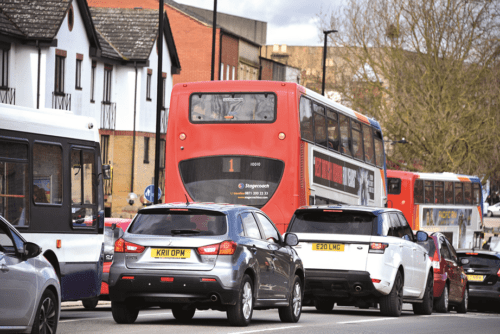
The Business Development Director of Stagecoach East, David Boden, is calling on utility companies to think about the impact their works will have on bus services, reports Steven Knight. The company also wants local authorities to play their part including effective parking enforcement.
David, who is also Chairman of the Cambridge & Peterborough Bus Alliance, said: “The issue of congestion is of supreme importance in our region, which already has congested centres like Cambridge and Peterborough.”
He added that the regions’ bus operators share the Cambridgeshire & Peterborough Combined Authority Mayor, Deputy Mayor, District, City and County Council leaders passion and commitment to bus improvements. “We want to work with them to deliver real improvements now,” he said.
“There is a big difference between reliability and punctuality. Reliability means that we, as bus operators, will provide a bus and driver to operate the service – this is within our control and it is right and proper that we are held accountable for that. All bus operators in the Cambridgeshire and Peterborough area have made great strides over the last year to deliver on reliability.
“Punctuality, though, is dependent on the bus being able to then operate to time on the highway network. Our very real challenge here is congestion on our roads, as increased delays mean a need for more buses on the road, which, in turn, increases the costs that must be passed on to our customers.”
Stagecoach East has previously explained the effects of traffic congestion on a 20.5 mile route with a 10 minute frequency operating between 0700 and 1900hrs: It reported that where the average speed is 15mph the journey time is 82 minutes, requiring nine buses and 4,292 passengers a day to cover the £6,525 operating costs. If average speed reduces to 12mph two more buses are required and an additional 954 passengers a day needed to cover the increased costs of £7,975. The journey time becomes 103 minutes.
A further drop in average speed to 10mph means that the journey time becomes 123 minutes and 13 buses are needed to run the service. To cover the £9,425 operating costs the route needs to carry 6,201 passengers a day.
Heavy congestion in Cambridge alone in recent months has forced Stagecoach to cancel journeys in order to get buses back on time, which impacts passenger confidence. David is clear, however, that the problem will exist whatever model is used to deliver bus services: enhanced partnership or franchising. He adds: “If we cannot get real progress on this soon, it puts at risk all of the hard work we are all doing and will do nothing to attract new customers to use bus services.”
There is an acknowledgement that elected officials are working hard in this area but says there is more to be done. On behalf of the Cambridgeshire & Peterborough Bus Alliance, David said: “There is a way forward, whereby utility companies would need to demonstrate, in writing, what they have done to understand the bus services they are impacting and the measures, with evidence, they have taken to mitigate this before they can get a permit to work.”
To bring home the extent of the issues, David added: “Recently I followed the progress of our number 8 service from Cottenham to Cambridge during the afternoon rush hour. This should take 33 minutes to complete its journey, but it took 73 minutes. Likewise, one of our number 13 services from Cambridge to Haverhill, which should have taken 52 minutes, took over an hour and a half.
“Success in bus operations is achievable, as we have seen in other areas of the UK where bus operators and local authorities work together for those twin goals of high-quality bus service delivery, supported by public policies that are designed to promote, encourage and support bus use.”

